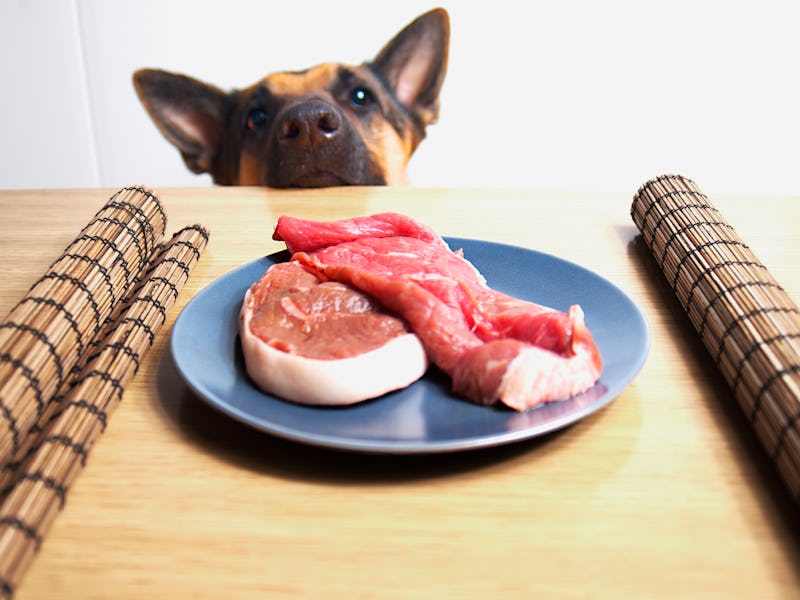Should You Feed Your Dog A Raw Meat Diet? Veterinarians Explain the Forgotten Risks
Is a raw meat diet any better for dogs than kibble?

We know that dogs love to sneak a piece of meat from our plates. But a corner of TikTok has taken this gesture one step further: Dog parents on the app are broadcasting themselves filling puzzle bowls with raw animal protein and organ meat for their pups to eat.
They choose this diet for the purported health benefits that supposedly come from uncooked animal products over commercially available kibble and wet food. One video even claims that a raw meat diet improves digestion, strengthens the immune system, increases energy levels, and makes aesthetic changes like better-smelling breath and a shinier coat.
But is a raw meat diet any better for dogs than kibble? For a few reasons, some veterinarians advise pet parents to steer clear of feeding their fur babies raw meat.
Chief among these reasons is the risk of infection. “I absolutely do not recommend raw meat-based diets because of their potential for harmful bacteria,” Julie Churchill, professor of veterinary nutrition at the University of Minnesota College of Veterinary Medicine, tells Inverse. Raw commercial beef, pork, and chicken harbor potentially dangerous bacteria like salmonella, E. coli, campylobacter, and listeria, which can sicken both humans and furry friends.
“The scientific literature is pretty clear that feeding raw and undercooked meat poses a higher risk of infection with food-borne pathogens,” says Cullen Domaracki, clinical assistant professor of veterinary primary care and dentistry at the University of Florida College of Veterinary Medicine.
Dogs may get mild gastrointestinal symptoms that resolve on their own, but sometimes, these infections can turn deadly. Further, even if a dog doesn’t get severely ill, the animal can shed these pathogens in their feces for weeks, creating many opportunities for human infection as well. A 2023 study in the journal One Health found that in 600 dogs, those who ate raw meat were more likely to excrete an antibacterial-resistant strain of E. coli.
Considering how up close and personal dogs get with each other’s butts, humans are also much closer to these bacteria than we’d like to think. “The universal dog greeting is to sniff each other's behind,” Churchill says. “And then they love to kiss their family.” If you’re feeding your dog raw meat, there are ample opportunities to make contact with harmful bacteria long after the meal has been devoured.
Nor is there abundant clinical evidence that uncooked animal tissue is significantly more nutritious than kibble. “To my knowledge there are no peer-reviewed articles or data indicating raw meat carries any health benefit to our canine patients,” Domaracki says. Churchill takes a harder-line stance: “Raw meat has no nutritional advantage,” she says.
It’s difficult to glean clear answers from research. A 2024 study published in the journal Frontiers of Veterinary Science looked for various health markers in 55 dogs who ate either kibble or a raw meat diet for 28 days. Because of the study’s size, brevity, and inclusion of only healthy dogs, the researchers concluded it was unclear whether any observed changes, including markers for inflammation in the blood and small intestine, were good or bad.
As much as dogs love a little chicken or steak, they’re actually omnivores and don’t need to eat meat. They can utilize carbohydrates from plants for nutrients. And, if a pet parent takes it upon themselves to make all their dog’s food, they run the risk of nutrient deficiencies.
“One concern we have with people making homemade raw food diets is that they may not be properly balanced to contain all the nutrients their dog may need,” Domaracki says. He says that high-quality commercial dog food must meet requirements for sufficient protein, vitamins, minerals, and other nutrients for every size and life stage.
Churchill says that pet parents ask her every day about raw meat diets for their fur children. She largely hears that pet parents are concerned over how processed commercial dog food is. After all, we rail against ultra-processed foods for humans. But Churchill likens dog food to baby formula in that it’s processed to be complete and balanced, containing all the nutrients they need at whatever life stage.
“It's a completely different goal in dog food,” Churchill says. “Processing is to achieve that complete and balanced, high quality, nutritious product.”
For those who insist on raw meat, Churchill suggests going for “a commercially available complete and balanced product that has undergone high-pressure pasteurization” (HPP), which is a method of inactivating harmful microorganisms in food.
Still, “that doesn't mean that the food is the very best fit for that pet,” Churchill says, “but at least I feel it's safe.”